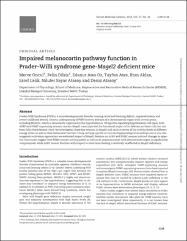Impaired melanocortin pathway function in prader-willi syndrome gene-magel2 deficient mice

Göster/
Erişim
info:eu-repo/semantics/openAccessTarih
2018Yazar
Öncül, MerveDilsiz, Pelin
Ateş Öz, Edanur
Ateş, Tayfun
Aklan, İltan
Çelik, Eşref
Sayar Atasoy, Nilüfer
Atasoy, Deniz
Üst veri
Tüm öğe kaydını gösterKünye
Öncül, M., Dilsiz, P., Ateş Öz, E., Ateş, T., Aklan, I., Çelik, E. ... Atasoy, D. (2018). Impaired melanocortin pathway function in prader-willi syndrome gene-magel2 deficient mice. Human Molecular Genetics, 27(18), 3129-3136. https://dx.doi.org/10.1093/hmg/ddy216Özet
Prader-Willi Syndrome (PWS) is a neurodevelopmental disorder causing social and learning deficits, impaired satiety and severe childhood obesity. Genetic underpinning of PWS involves deletion of a chromosomal region with several genes, including MAGEL2, which is abundantly expressed in the hypothalamus. Of appetite regulating hypothalamic cell types, both AGRP and POMC-expressing neurons contain Magel2 transcripts but the functional impact of its deletion on these cells has not been fully characterized. Here, we investigated these key neurons in Magel2-nullmice in terms of the activity levels at different energy states as well as their behavioral function. Using cell type specific ex vivo electrophysiological recordings and in vivo chemogenetic activation approaches we evaluated impact of Magel2 deletion on AGRP and POMC-neuron induced changes in appetite. Our results suggest that POMC neuron activity profile as well as its communication with downstream targets is significantly compromised, while AGRP neuron function with respect to short term feeding is relatively unaffected in Magel2 deficiency.

















